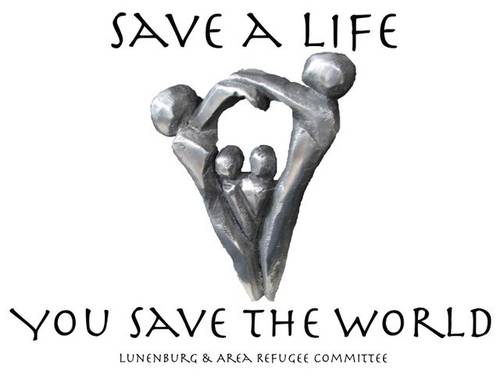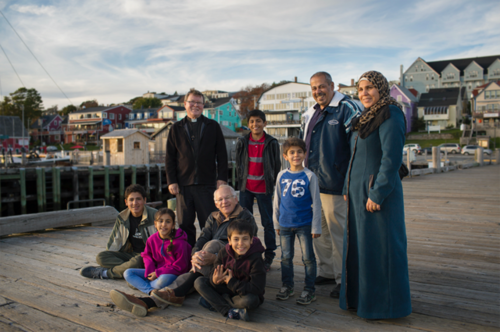Refugee Family Sponsorship in Lunenberg, NS
20/03/2017 01:18:35 PM
| Author | |
| Date Added | |
| Automatically create summary | |
| Summary |
By David Friendly
In late 2015, I was one of 50 residents of the Lunenburg, Nova Scotia area who met at the St. John’s Anglican Church to discuss whether we could collectively sponsor a Syrian family under the umbrella of the Anglican Diocese of Nova Scotia and PEI, one of the local Sponsorship Agreement Holders with the Canadian Government. At that meeting were people from 5 local churches, the Rotary Club and me. I am a friend of the Anglican priest, Father Michael Mitchell (I know, I get a kick out of that every time I say it), with whom I have conducted several model seders prior to their Easter celebrations to demonstrate the importance of Jewish traditions on their own faith and history.
 Following that meeting, a steering committee of 15 was formed to manage the project. Father Michael asked me to lead that group, possibly to avoid power issues amongst the various churches. I accepted, to honour the 100th anniversary of my father’s birth, because he would have been one of the first to volunteer for such a rewarding task. We called the group the Lunenburg and Area Refugee Committee (LARC). The banner head for our web site shows a bird flying free.
Following that meeting, a steering committee of 15 was formed to manage the project. Father Michael asked me to lead that group, possibly to avoid power issues amongst the various churches. I accepted, to honour the 100th anniversary of my father’s birth, because he would have been one of the first to volunteer for such a rewarding task. We called the group the Lunenburg and Area Refugee Committee (LARC). The banner head for our web site shows a bird flying free.
We began immediately to organize, probably not in a dissimilar way to the Darchei Noam group. I had people step forward to coordinate gathering clothing, household goods, toys, bicycles, organize transportation and coordinate with the local school and language school for adults. (Lunenburg is fortunate to have a new international language school right in the middle of town.) The various ministers agreed to issue information in their pre-Christmas mailings, and all made appeals from the pulpit at their Christmas services. Within a month we had collected almost $40,000 plus a whole household of furniture and clothing. This was a family project for me, as Maureen coordinated the household goods collection. It was a community project for them, as over 100 people contributed time, money and goods.
Once we had enough money to qualify as sponsors, we applied through the Diocese office and the Canadian authorities approved our status within one week. We had been given a list of 5 potential families. Since we were such a large group, we agreed to take in a large family who might have a more difficult time finding a sponsor because of the cost. We also decided that the family would fit best in our community if they had young children who could go to the local school (which only goes to grade 9). That family was the Ayash/Alkrad clan — a mother and father with 5 children (4 boys and 1 girl) between the ages of 5 and 14. We had no idea how long the rest of the process would take, but within a few weeks, they had passed their medical and security checks and were on the list to be flown to Canada, hopefully before the self-imposed March 1 deadline to meet the quota promised by our new government. During those few tense weeks, I was able to make contact with Ahmad over Skype, so that I could assess his English language skills and get to know him a bit better. I also wanted to ensure that he was aware of what was happening and what steps we were taking to rescue them. After a few sessions, his wife Fatmeh and their kids were brave enough to show themselves on the computer screen. During that time, a bond started to form between Ahmad and me. I could see that we had many common views on life, family and even religious influence. I could have been talking to a cousin. (If there were such a thing, I would have called him a Reconstructionist Muslim.)

And then, with less than one week’s notice, the family were told that they were accepted and we were told to expect them on February 28! Maureen and I were really upset. We were going to be away that week and would not be able to welcome them in person. But, my committee picked up the slack and the welcome was exciting and warm. They were on one of the last flights out of the Middle East under the original airlift. I like to think that 5-year old Ali was number 25,000! We realize how lucky we were when there is a third family who were approved last February to come to Lunenburg who have yet to make the journey to freedom.
The family settled quickly into their new home — a bit cramped by Toronto standards, but a palace for them. Five years before they had left everything behind that could not fit into their car and high-tailed it from the south-western city of Daraa, Syria to the Jordanian border where they were admitted as refugees. This, after snipers started picking people off in the streets and even through their living room windows. Ahmad felt he had to do anything possible to save his family. Many of his relatives also made it to Jordan, but some who did not leave have not been heard from in several years. They were able to find a small apartment and Ahmad was able to get contract work as a structural engineer, his trained profession. However, the pay that is offered to refugees in Jordan is a quarter of the normal amount and rents are higher for them than for citizens.
It has now been almost a year from their arrival. When they got here, Ahmad had taught the kids to say “I am fine” in response to any greeting; and they answered “yes” to any other question, not knowing any other English, but eager to please. They are now all five of them in school and have friends in the community. Many of us have become surrogate grandparents to them and several of us are working regularly with them on English comprehension, learning about how things are done in Canada, staying warm and generally having a good time. We have celebrated birthdays now for all 5 kids. A local company which produces carbon fibre for the aerospace industry offered to provide Ahmad with work for 6 months, a contract which expires at the end of January. He is working to get his Canadian engineering certification and hopefully will be able to work near enough to allow them to stay in Lunenburg. Fatmeh attends English language school 4 mornings a week, a program we were able to get funded for all of the new residents in the area.
Last fall, we were approached by two independent journalists who were contracted by the United Nations High Commission for Refugees (UNHCR) to show the world how successful the Canadian model was in welcoming and integrating Syrian former refugees into our society. They spent 4 days in Lunenburg and the result is a short video and description of the Lunenburg experience.
When LARC was formed and I was asked to take the lead, I felt that I was continuing to contribute as a member of Darchei Noam, living so far away from my congregation. This, I felt, would be the kind of thing we would do — and I soon discovered that the Toronto “branch” of the congregation was doing just that. I brought some of Darchei Nam to this community too, in encouraging our group to adopt a slogan that would guide us through our months of work. It was a phrase I learned at Darchei Noam: Save a life, and you save the world. I even provided a graphic representation of that with the photo of a sculpture that my late Aunt Sylvia (Friendly) Schneiderman z”l had made a few years before. I have attached a copy of the photo here along with a picture that the journalists took of us on the wharf in (free) Lunenburg.
To say that this has been a life-broadening experience is an understatement. It is so easy, and depressing, to believe that we cannot do anything to solve the larger problems that are plaguing the world and robbing us of our happiness and peace. But we can — and have — done over 25,000 ’somethings’ in Canada (and growing). We are saving the world, one life at a time. And I believe that it is working.
Thu, 18 April 2024
10 Nisan 5784
Upcoming Programs & Events
Apr 18 Ma Nishma? What's Happening in Israel? Thursday, Apr 18 7:00pm |
Apr 23 Passover Services Tuesday, Apr 23 9:00am |
Apr 23 Second Night Passover Seder Tuesday, Apr 23 6:30pm |
Apr 27 Join us to say Todah Raba and L’Hitraot to Yaron! Shabbat, Apr 27 10:00am |
Apr 29 Passover Services Monday, Apr 29 9:00am |
This week's Torah portion is Parashat M'tzora
| Shabbat, Apr 20 |
Candle Lighting
| Friday, Apr 19, 7:53pm |
Havdalah
| Motzei Shabbat, Apr 20, 8:58pm |
Erev Passover
| Monday, Apr 22 |
Subscribe to our Friends of Darchei Noam Mailing List


